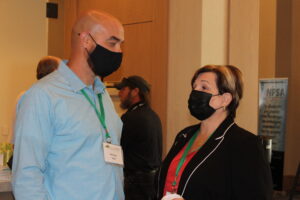
Virginia enables modular construction momentum through standards
Code officials build on lessons learned in International Code Council Off-Site and Modular Construction Consensus Committee
Beginning in July 2019, the ICC Off-Site and Modular Construction Consensus Committee (IS-OSMC), which was appointed by the International Code Council Board of Directors, began work on standards for off-site and modular construction. The committee developed the ICC/MBI 1200-2021 Standard for Off-site Construction: Planning, Design, Fabrication and Assembly and the new ICC/MBI 1205-2021 Standard for Off-site Construction: Inspection and Regulatory Compliance. Those standards were approved on June 28, 2021, by the committee and then received ANSI approval as American National Standards on July 19, 2021. The following profile is the first of several that will come out in the coming year focusing on the value of these standards in supporting the off-site and modular construction best practices in building code departments across the country.
The growing interest and adoption of off-site and modular construction in the U.S. is a trend that is reshaping conventional thinking for construction professionals as well as the familiar practices for those responsible for upholding safety and quality standards and regulations.
 In Virginia, the modular trend is one that immediately captured the attention of Jeff Brown when he took over as the director of the State Building Codes Office for the Division of Building and Fire Regulation within the Virginia Department of Housing and Community Development (DHCD) in 2017. Specifically, he oversees the state’s code development process, technical support services, manufactured housing program and industrialized building programs. Prior to joining DHCD, he had accumulated more than 20 years of experience in the construction industry, including 14 years in the enforcement and administration of building and fire codes as well as 27 International Code Council code enforcement certifications, including the prestigious Master Code Professional (MCP) designation.
In Virginia, the modular trend is one that immediately captured the attention of Jeff Brown when he took over as the director of the State Building Codes Office for the Division of Building and Fire Regulation within the Virginia Department of Housing and Community Development (DHCD) in 2017. Specifically, he oversees the state’s code development process, technical support services, manufactured housing program and industrialized building programs. Prior to joining DHCD, he had accumulated more than 20 years of experience in the construction industry, including 14 years in the enforcement and administration of building and fire codes as well as 27 International Code Council code enforcement certifications, including the prestigious Master Code Professional (MCP) designation.
Over the years, the state has seen a steady rise in modular construction practices. Even in 2020 with the COVID-19 pandemic, which resulted in the temporary halt of production for some factories and factory-constructed housing developers, the state saw a three-percent increase compared to 2019. Last year, DHCD saw a 24-percent increase from 2020 in the number of industrialized building registration seals issued.
Brown confirmed, “Given workforce challenges and the need for affordable housing, it’s clear this is a construction practice that is essential to our community development. Therefore, when I joined DHCD, I began to familiarize myself with Virginia’s modular and offsite program, talking to modular industry representatives, third-party inspection agencies and modular representatives from other states to get a better understanding of how modular construction is designed and approved, not just in Virginia, but throughout the U.S.”
One of the hurdles he saw was the duplication of effort across borders. Unlike site-built and manufactured housing, there is no national or international standard, so many state building departments have necessarily developed a customized approach to offsite and modular construction regulations.
“In some instances, those individual approaches have resulted in a duplication of effort by state officials, and some unnecessary or repetitive hurdles for industry practitioners,” he explained. “When I heard that ICC was going to form a committee to begin development of an off-site and modular construction standard, I immediately put in my application to get involved.”
He believes that the new standards are a critical step in harmonizing the design and approval of off-site construction and an important step in addressing construction workforce issues and the growing need for affordable housing.
Code connections
As a member of the International Code Council Off-Site and Modular Construction Consensus Committee (IS-OSMC), Brown had an opportunity to see the broad range of current practices.
“Like other code officials, we’re continually looking for ways to improve regulations and processes to allow for new materials, methods and technologies,” Brown said. “Key in that effort is to ensure nothing in our regulations is putting up roadblocks or barriers to alternative construction practices.”
The goal of the first committee was to develop the ICC/MBI 1200-2021 Standard for Off-site Construction: Planning, Design, Fabrication and Assembly and the ICC/MBI 1205-2021 Standard for Off-site Construction: Inspection and Regulatory Compliance.

The standards include provisions for compliance, submittal documents, in-plant and on-site inspections. For Brown, the process of standards development opened his eyes to the importance of standardization and communication.
“Through the development of these standards we found that many of us are doing things the same way — but there was very little written down as a standard,” Brown added. “For example, most states with modular programs have specific policies related to modular construction inspections and plan reviews. While the requirements in those policies have a lot of similarities, there are also some differences in each of them. This can be a real challenge for manufacturers and inspectors to keep up with.”
Brown also noted a renewed clarity of purpose. “One of the most important ways we’ve adapted as a consequence of the standard development is in clarity of purpose. Through my experiences on the committee, we have a clearer understanding of some the challenges that manufacturers and contractors face, which has allowed us to improve processes and policies to streamline requirements.”
In 2021, DHCD updated the Virginia Uniform Statewide Building Code and the Virginia Industrialized Building Safety Regulations to include improvements related to panelized construction, intermodal shipping containers used as building components, tiny houses and accessory dwelling units.
Brown added, “Those updates were focused on making improvements to our regulations to streamline the approval process and encourage the use of new or alternative construction methods, materials, technologies and housing options in Virginia.”
In 2022, following the approval of the ICC/MBI 1200-2021 and 1205-2021 standards, DHCD is looking to incorporate ICC/MBI 1200-2021 and 1205-2021 standards into Virginia’s Industrialized Building Safety Regulations that would go into effect in 2023.
More work to be done
One of the greatest values of working on the committee, according to Brown, has been the relationships developed during the process. “The opportunity to compare notes about our practices and brainstorm new ideas has opened the door for continuous improvement,” he explained.
He points to the oversight of third-party inspection agencies in factories as one potential idea. “Most states that allow third-party inspections have auditors that visit off-site factories to verify compliance. What if we unified those efforts by sharing documentation about recent visits and deficiencies or quality practices? We see more ideas like this moving forward as we continue to share ideas as a way to deliver the best possible services,” he said.
While Brown believes the development of the first two standards was a big accomplishment, he knows there is work to be done.
“I think over the next few years, as people see the standards and get more comfortable with them, and more states and jurisdictions consider the adoption of those standards, we’ll see real progress,” said Brown. He likens the potential value of the new and emerging standards to the benefits that international model codes have provided to the site-built industry.
Brown concluded, “I’m looking forward to continued movement to national standards that everyone can accept for modular construction. Those standards are essential if we are to meet the needs of our communities with efficiency and effectiveness in coming years.”








